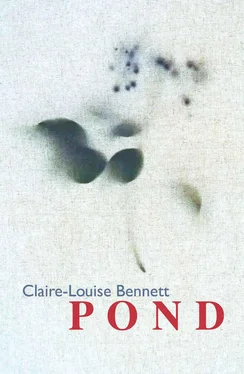I made sly enquiries just as a child does but unfortunately in contrast to a child I was listened to rather too attentively and so I quickly devised a wholesome reason for wishing to know who owned the land and whether I might visit it from time to time. It would be a very excellent place to grow things I’m sure, I said and despite having never demonstrated any enthusiasm for gardening before and despite my statement of interest being really rather vague my proposition was taken seriously and since it turned out the land was in fact owned by the Catholic Church I was directed to the large house on the corner where the parish priest himself resided. This development was not something I had foreseen, truth be told I’d had no purposeful intentions. I think I just fancied the idea of having a secluded place to stand about in now and then, a secret garden if you like. And I should never have said a word about it because as usual the minute I did it all became quite misshapen and not what I had in mind at all, and yet there was something so alien and absurd about how it was all progressing that I couldn’t help but go right along with it.
He was pleasantly perfunctory and did not mention anything at all about God, though he did enunciate the word bounty rather pointedly, but I didn’t flinch. Where do you live, he said. Over in that house there, I said, and pointed through the window at a house across the road. He didn’t look in the direction of my finger, it was quite sufficient for him that I could stand where I was and at the same time point to my house, and so it was settled. I do not remember the interior of the priest’s house. I think the wallpaper in the hallway might have been sage green. It could be the case that I went in no further than the hallway. Perhaps I just stood at the door on the street looking in at the hallway. And then down at the plastic step. Yes, I believe he was wearing trainers in fact.
Clearing a decent area of ground and making it ready for planting potatoes was hard and monotonous work added to which early spring tends to be rather humid here and indeed it was so that particular year. I do not know fully what drove me to deracinate thick and fuzzy weeds like that every day in the premature heat. I often stopped and stood quite still, wondering what hopes my mind had just then been taken up with, but I could seldom recall. However, in spite of my own bemusement, for the first time in my adult life other people knew exactly what I was doing. It was as plain as day to them. I’d come back with the tools and lean them against the house wall and go inside to wash my hands and it would be quite clear to anyone who saw me what I had been doing that day. I believe during that period people were, notwithstanding two or three specific incidents, conspicuously more agreeable towards me.
As with most mensurable areas of life I demonstrated no ambition whatsoever as a grower and selected to cultivate low-maintenance crops only. Potatoes, spinach, and broad beans. That was it. That was enough. People told me what a cinch it was to grow courgettes, squash, marrow, carrots, but nothing had changed really — I hadn’t suddenly become a gardener, and I resented being spoken to as though I had. The plants were coming on quite nicely when I received an invitation to speak at a very eminent university across the water upon a subject I was very interested in indeed — though not necessarily in a meritorious way. That’s to say my interest was far too personal and not strictly academic and so my methodology came across as nostalgic and my perspective rather naive since I ignored the usual critical frameworks which were anyhow quite incomprehensible to me and instead pilfered haphazardly from the entire history of Western literature in order to strengthen my argument, which I cannot now recall. It had something to do with love. About the essential brutality of love. About those adventitious souls who deliberately seek out love as a prime agent of total self-immolation. Yes, that’s right. It attempted to show that in the whole history of literature love is quite routinely depicted as an engulfing process of ecstatic suffering which finally, mercifully, obliterates us and delivers us to oblivion. Dismembered and packed off. Something like that. Something along those lines. I am mad about you. I am going out of my mind. My soul burns for you. I am inflamed. There is nothing now, nothing except you. Gone, quite gone. That kind of thing. I don’t think it went down very well.
In fact I think it was considered rather unsophisticated and I remember feeling, despite my new floral chemise, suddenly sullen and practically Gothic. Actually, now that I come to think of it, I think the gist of my argument was simply that love is indeed a vicious and divine disintegration of selfhood and that artistic representations of it as such aren’t at all uncommon or outlandish and have nothing whatsoever to do with endeavouring to shock an audience. There was an awful lot of violence you see in the work of the playwright the conference was reputedly reassessing and by and large that violence had hitherto been widely interpreted as nothing more than a dramatic strategy designed to shock, which I could never quite accept because how on earth is there anything shocking about violence? Anyway, I must confess, in order to establish a perennial language of love that testified to the abominable emancipation that is brought on by want of another I did in fact reference not only Sappho, Seneca, Novalis, Roland Barthes, Denis de Rougement and Dutch historian Johan Huizinga I also included lyrics by PJ Harvey and Nick Cave, with the somewhat misplaced intention of demonstrating that it just never stops. That the desire to come apart irrevocably will always be as strong, if not stronger, than the drive to establish oneself. As deep as ink and black, black as the deepest sea .
Afterwards, when people were milling about and nodding in little groups, and I wasn’t sure which of the several exits to make immediate use of, one of the academic big guns approached me and commented upon my paper. This all happened several years ago by the way — and I’m not absolutely sure why I’m recounting it here since it hardly situates me in a very flattering light — anyway, I don’t recall exactly what he said to me, but it was exceedingly condescending and I very very clearly remember thinking why don’t you fall over. Why don’t you become tangled in some cables near the screen at the front on your way out and fall over and why don’t you smack your head off a very sharp corner of the desk where earlier I sat and delivered my oh so charming missive and cut your head open ever so slightly so that a little bit of blood drops out. Just a little trickle of blood so that you don’t look injured, only stupid and a bit iffy. Thank you very much, I said. And suddenly my back went cold so I deduced that the outside must after all be right there behind me; I turned around and walked towards it and very soon the ground did in fact change. It was wet and the car park was almost empty and smelt exclusively of dishcloths.
I may as well mention that I was staying with a girl I’d met in London the previous year. She was a very gifted academic and her ability to formulate a rousing opinion in response to something that had just happened or had just been said never ceased to impress and baffle me. How anyone could sally forth thoughts that were unfailingly well-formed and de rigeur, so soon and in any situation, was quite beyond me. She lived in a terrace house with several other postgraduate students, one of whom was a bloke as a matter of fact, and later, when my friend had gone to bed, he came into the sitting room where I sat with a large book flopped in my lap and put a hot water bottle underneath my toes. We didn’t kiss then; we kissed later, a few weeks later. I flew home first and then we wrote to each other and then we really needed to see each other. So I went back, and then we kissed.
Читать дальше












